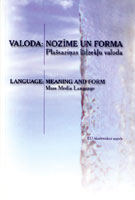Akuzatīva, bezprievārda ģenitīva un prievārda ģenitīva konkurence adverbālās konstrukcijās
Concurrence of Accusative, Non-Prepositional Genitive and Prepositional Genitive Case Forms in Adverbal Constructions
Author(s): Anta NovikovaSubject(s): Language and Literature Studies, Philology
Published by: Latvijas Universitātes Akadēmiskais apgāds
Keywords: genius; accusative; folding competition; pre-constructions; adverb constructions;
Summary/Abstract: Although the language standards are seemingly fixed, in some occasions it has become possible to use different case forms for expressing the same meaning. In particular occasions, one case form of noun (or its substitute) can compete with another case form, forming the concurrence of case forms. The usage of accusative, non-prepositional genitive or prepositional genitive may vary according to the function of the object, in the partitive, target or ablative meaning. Choice of the case form in these constructions may be affected by the wish of the speaker to express a stylistic nuance. The language standard allows to use both genitive and accusative forms in adverbal constructions with partitive meaning, accusative, prepositional and non-prepositional genitive forms with target meaning and both prepositional and non-prepositional genitive case forms in adverbal constructions with ablative meaning. In this article, materials from today’s Latvian newspapers and magazines are used to show that in current Latvian, in adverbal constructions with partitive, target and ablative meaning, the usage of accusative and prepositional genitive cases is more popular, but the non-prepositional genitive case is also used from time to time – usually to obtain a stylistic effect. The usage of the historically older non-prepositional genitive case form attracts the attention of readers and highlights the contents of the sentence. It is recommended to authors and editors to keep using various means of expression in order to obtain a stylistic effect.
Journal: Valoda: nozīme un forma
- Issue Year: 2009
- Issue No: 1
- Page Range: 66-72
- Page Count: 7
- Language: Latvian

